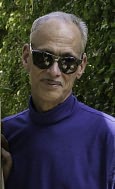- Shopping Bag ( 0 items )
From Barnes & Noble
In his quest to catch rides from strangers, hitchhiker/famed filmmaker John Waters (Hairspray; Pink Flamingos) carried a sign that might not have always helped: "I AM NOT A PSYCHO." Fortunately, it took only 15 rides and eight days for this eccentric adventurer to thumb his way from hometown Baltimore to sunny San Francisco (where, it happens, he has a second home). Along the way, he gathered stories of Zen-like encounters, including encounters with a indie rock band, an octogenarian farmer, and a Korvette-driving Colorado Republican. A road trip of true wonder.





Overview
A cross-country hitchhiking journey with America’s most beloved weirdo
John Waters is putting his life on the line. Armed with wit, a pencil-thin mustache, and a cardboard sign that reads “I’m Not Psycho,” he hitchhikes across America from Baltimore to San Francisco, braving lonely roads and treacherous drivers. But who should we be more worried about, the delicate film director with genteel manners or the unsuspecting travelers transporting the Pope of Trash?
...